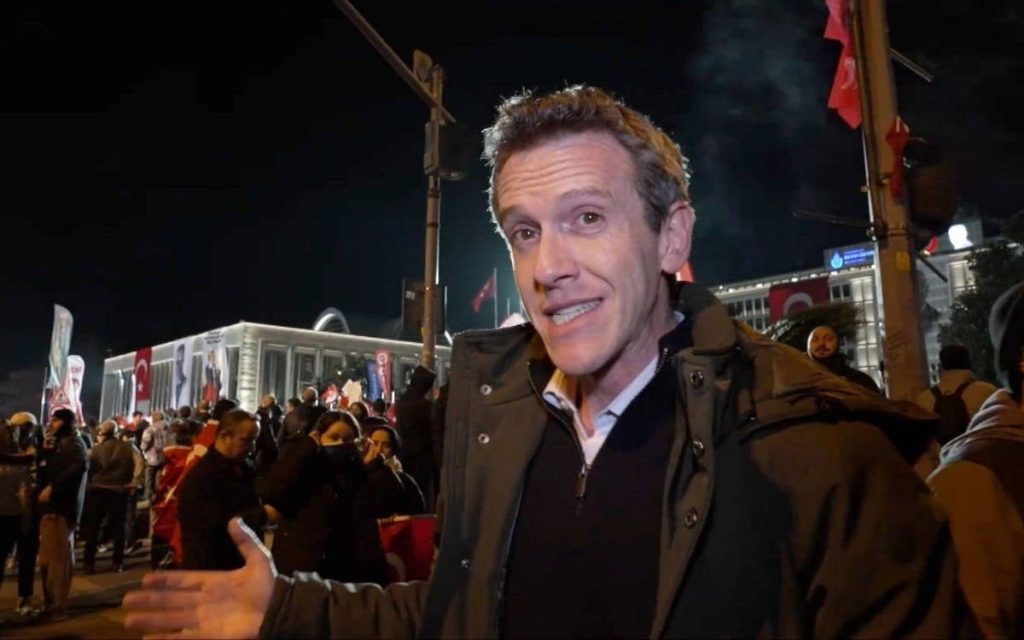BBC correspondent Mark Lowen was deported from Turkey today following a 17-hour police detention in Istanbul. The incident stems from his coverage of protests that erupted after the arrest of Istanbul Mayor Ekrem İmamoğlu. Lowen has since expressed his distress over the situation, highlighting the importance of press freedom as fundamental to democracy.
| Article Subheadings |
|---|
| 1) Context of the Deportation |
| 2) Reaction from BBC and Press Freedom Advocates |
| 3) Recent Trends of Journalist Deportations |
| 4) Implications for Media Coverage in Turkey |
| 5) Overall Impact on Journalism in Turkey |
Context of the Deportation
On March 19, significant protests erupted in Istanbul following the controversial arrest of Mayor Ekrem İmamoğlu, a member of Turkey’s main opposition party. Covering this tumultuous period, Mark Lowen had arrived in the city to report on the unfolding events as they attracted national and international attention. His detention by police was marked by claims that he posed a “threat to public order,” a label that authorities often use against journalists involved in reporting sensitive political situations.
Lowen’s time in Turkey had spanned five years, during which he built a reputation as a knowledgeable and experienced correspondent, having covered several significant events in the country. His recent comments expressed a deep emotional connection to Turkey, underscoring the distress he felt at being expelled from a country he had once called home.
Reaction from BBC and Press Freedom Advocates
The deportation of Mark Lowen prompted a swift and stern reaction from the BBC and various international press organizations. Executive Deborah Turness, CEO of BBC News, referred to Lowen’s detention and deportation as “extremely troubling.” She stated that “no journalist should face this kind of treatment simply for doing their job,” signaling a commitment to fight for press freedoms on behalf of its staff.
Press freedom advocates echoed these sentiments, emphasizing the dangers journalists face while performing their duties in environments that are often hostile to independent reporting. They argue that press freedom is not only essential for the protection of journalists but is also a cornerstone of democratic societies, which rely on free flow of information and diverse viewpoints.
Recent Trends of Journalist Deportations
The deportation of Mark Lowen is not an isolated incident but rather part of a broader pattern of journalist repression in Turkey. Recent months have seen several foreign journalists faced deportation or denial of entry into the country. Just days prior to Lowen’s incident, Belgian journalist Chris Den Hond was denied entry into Turkey while covering cultural celebrations. Similarly, Canadian journalist Neil Hauer encountered deportation last November under similar circumstances.
Both Den Hond and Hauer suggested they had been placed on a “blacklist,” a troubling indication of the increasing restrictions placed on freelance and foreign reporting in Turkey. This trend raises serious concerns for citizen access to unbiased news and the safety of reporters covering critical issues within the region.
Implications for Media Coverage in Turkey
As protests swelled following the arrest of Ekrem İmamoğlu, traditional media and journalists found themselves under substantial pressure from the government. A recent crackdown resulted in the detention of at least 11 journalists, accused of participating in protests instead of merely reporting on them. During house raids, seven journalists were taken into custody, only to be released after three days without charges.
The Turkish media regulator further imposed severe repercussions on pro-opposition channels, such as a comprehensive 10-day blackout for Sözcü TV. Such actions contribute to an increasingly hostile environment for journalists, prompting fears among citizens and advocates regarding the overall climate for free speech and independent journalism.
Overall Impact on Journalism in Turkey
The broader implications of incidents like that of Mark Lowen illustrate a tightening grip on press freedom in Turkey, raising alarms not only locally but also internationally. Journalists operating within Turkey face an increasingly perilous landscape with their ability to report fairly and freely under considerable threat.
As authorities continue to curtail dissenting voices, Turkey’s standing as a democracy may be increasingly questioned. The consistent harassment of journalists, particularly during politically sensitive events, serves to stifle public discourse, limit accountability, and undermine democratic processes.
| No. | Key Points |
|---|---|
| 1 | BBC correspondent Mark Lowen was detained and deported while covering protests in Turkey. |
| 2 | Lowen expressed distress over being labeled a threat to public order, stating journalism is not a crime. |
| 3 | The BBC and press freedom advocates condemned the deportation, emphasizing the importance of free journalism. |
| 4 | Lowen’s deportation follows a trend of increased repression against journalists in Turkey. |
| 5 | Recent detentions of journalists during protests highlight challenges facing free press in the country. |
Summary
The recent deportation of Mark Lowen underscores the escalating pressures faced by journalists in Turkey. It signals a worrying trend of repression affecting both domestic and foreign reporters, restricting their ability to cover essential matters openly. The pushback from media organizations and advocacy groups emphasizes the ongoing battle for press freedoms, a vital pillar of democratic societies. As such incidents persist, the future of independent journalism in Turkey remains precarious.
Frequently Asked Questions
Question: What led to Mark Lowen’s deportation from Turkey?
Mark Lowen was deported after being detained for 17 hours, during which authorities labeled him a “threat to public order” while he was covering protests connected to the arrest of Istanbul Mayor Ekrem İmamoğlu.
Question: How has the BBC reacted to the incident?
The BBC’s CEO described the deportation as “extremely troubling” and stated that no journalist should face such treatment while fulfilling their professional duties, indicating their intent to formally approach Turkish authorities.
Question: What recent trends have been observed regarding journalist arrests in Turkey?
There has been an increasing trend of deportations and detentions of journalists in Turkey, particularly during politically sensitive events, raising concerns over media freedom and public access to fair reporting.


